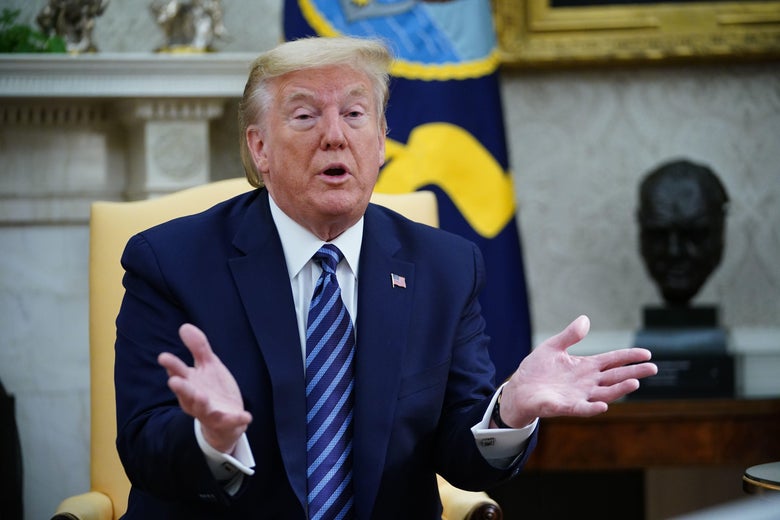
Trump during a meeting with Louisiana Gov. John Bel Edwards in the Oval Office on Wednesday.
Mandel Ngan/Getty Images
Slate is making its coronavirus coverage free for all readers. Subscribe to support our journalism. Start your free trial.
On Wednesday, President Donald Trump said that he would not extend federal social distancing guidelines to combat the coronavirus once they expire on Thursday. The end to the administration’s “Slow the Spread” campaign, which had been extended after an initial 15-day run that began in March, will leave states to decide how to proceed on their own. “They’ll be fading out because now the governors are doing it,” Trump said in a meeting with Gov. John Bel Edwards of Louisiana on Wednesday. The guidelines were incorporated into new recommendations for responsibly reopening states that the White House issued earlier this month, Vice President Mike Pence said, but critics have noted that these aren’t specific or binding.
The loss of a national social-distancing campaign comes as the U.S. is seeing daily rises in the death toll—more than 1,000 additional deaths have been confirmed every day since April 2—and as the country has recorded 61,288 deaths and more than 1 million cases of COVID-19.
The social distancing campaign is also ending amid insufficient testing. In order to lift restrictions safely, the U.S. will need millions of tests per week, according to separate reports released this week by the Rockefeller Foundation and Harvard’s Edmond J. Safra Center for Ethics. While the U.S. has ramped up testing in recent weeks, Adm. Brett Giroir, the official leading the federal government’s testing response, said there is “absolutely no way” the country will have the minimum of 5 million tests per day that the Harvard study cites, despite Trump’s promises to the contrary. (The most tests the country has done in a single day were 314,182, on April 22, according to the COVID Tracking Project.)
Yet Trump continues to share overly rosy predictions about the pandemic and the country’s ability to reopen safely. When asked why he expects COVID-19 to go away without a vaccine at a White House roundtable on Wednesday, Trump replied, “It’s going to be gone. It’s going to leave. It’s going to be eradicated.” That same day, Jared Kushner, Trump’s son-in-law and senior adviser, lauded the administration’s response to the pandemic as a “great success story.” Kushner added that he hopes the country will be “really rocking again” by July.
The lack of a cohesive federal response, compounded by Trump’s mixed signals on reopening individual states, has led to what Politico has called an “inconsistent patchwork of state, local and business decision-making,” which may lead to a second wave of COVID-19 cases or exacerbate the current outbreak. So far, states’ plans to reopen have diverged largely along partisan lines. Some states with Republican governors, including Alaska, Georgia, and Tennessee, have already started loosening restrictions, while others with Democratic governors, including Louisiana, Michigan, and North Carolina, have extended their lockdowns for at least another week. California Gov. Gavin Newsom plans to order the closure of all state parks and beaches starting Friday, CNN reported. Meanwhile, Gov. Greg Abbott of Texas will allow businesses in the state to start reopening the same day.
Despite the administration’s unfounded optimism and the varying state-by-state responses, an NBC/Wall Street Journal poll released on April 19 showed that 58 percent of registered voters are most concerned the country could move too quickly on lifting distancing restrictions, and a PBS NewsHour/NPR/Marist poll published on Wednesday showed that 65 percent of Americans think it’s too early to have people return to work.
Readers like you make our work possible. Help us continue to provide the reporting, commentary and criticism you won’t find anywhere else.
Join Slate Plusfrom Slate Magazine https://ift.tt/2VR4HQT
via IFTTT
沒有留言:
張貼留言